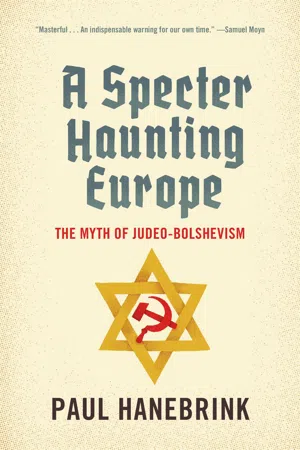
- English
- PDF
- Available on iOS & Android
About this book
"Masterful…An indispensable warning for our own time."
—Samuel Moyn
"Magisterial…Covers this dark history with insight and skill…A major intervention into our understanding of 20th-century Europe and the lessons we ought to take away from its history."
—The Nation
For much of the last century, Europe was haunted by a threat of its own imagining: Judeo-Bolshevism. The belief that Communism was a Jewish plot to destroy the nations of Europe took hold during the Russian Revolution and quickly spread. During World War II, fears of a Judeo-Bolshevik conspiracy were fanned by the fascists and sparked a genocide. But the myth did not die with the end of Nazi Germany. A Specter Haunting Europe shows that this paranoid fantasy persists today in the toxic politics of revitalized right-wing nationalism.
"It is both salutary and depressing to be reminded of how enduring the trope of an exploitative global Jewish conspiracy against pure, humble, and selfless nationalists really is…A century after the end of the first world war, we have, it seems, learned very little."
—Mark Mazower, Financial Times
"From the start, the fantasy held that an alien element—the Jews—aimed to subvert the cultural values and national identities of Western societies…The writers, politicians, and shills whose poisonous ideas he exhumes have many contemporary admirers."
—Robert Legvold, Foreign Affairs
Frequently asked questions
- Essential is ideal for learners and professionals who enjoy exploring a wide range of subjects. Access the Essential Library with 800,000+ trusted titles and best-sellers across business, personal growth, and the humanities. Includes unlimited reading time and Standard Read Aloud voice.
- Complete: Perfect for advanced learners and researchers needing full, unrestricted access. Unlock 1.4M+ books across hundreds of subjects, including academic and specialized titles. The Complete Plan also includes advanced features like Premium Read Aloud and Research Assistant.
Please note we cannot support devices running on iOS 13 and Android 7 or earlier. Learn more about using the app.
Information
Table of contents
- Cover
- Title Page
- Copyright
- Contents
- Introduction
- 1. The Idea of Judeo-Bolshevism
- 2. The Greater War
- 3. Refashioned by Nazism
- 4. A Barbarous Enemy
- 5. Under Communist Rule
- 6. From Judeo-Bolshevism to Judeo-Christian Civilization
- 7. Between History and Memory
- Epilogue
- Notes
- Acknowledgments
- Index